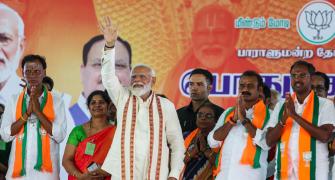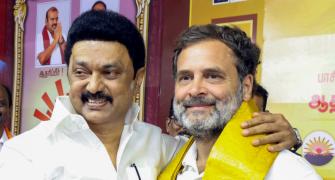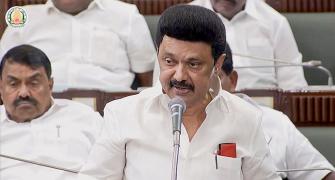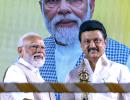The BJP often forgets that in Dravidian Tamil Nadu, the voter does not mix religion, which is personal, and politics that is in the public sphere, points out N Sathiya Moorthy.

Three in a row, starting with J Jayalalithaa's 'Modi-ya, Lady-ya' sweep in 2014, and Tamil Nadu has 'outright rejected' the 'Modi-Shah brand of divisive politics' by voting en masse for the ruling DMK-Congress combine for a second time in a row, after 2019.
Or, at least that's how the DMK alliance leaders will describe the outcome of the Lok Sabha seats this time, too, only words and phrases need to be changed from the collective DMK/AIADMK past of 10 long years and three elections.
If the BJP's loss comes on the top this time, it owes to the time that Modi and Shah spend, forming and breaking alliances and campaigning in the state as if the future of their national government depended almost exclusive on Tamil Nadu.
However, Modi was not at his vituperative best while campaigning for the first-phase polling in the state but topped it with the avoidable 'Katchchatheevu controversy', for instance, while campaigning elsewhere in the country.
At the top of the BJP's losses in the state is state President K Annamalai, who contested from what became his 'native' Coimbatore constituency, where his party and erstwhile AIADMK ally had independent strongholds, but not after losing it to the rival DMK combine in 2019.
Like in 2019, the western region as a whole has stayed with the DMK combine, flagging questions about the future of the AIADMK leadership of former chief minister Edappadi K Palaniswami.
If Edappadi can still breathe relatively easy, it's only because two of his breakaway faction rivals, in three-time CM, O Panneerselvam (OPS) and one-time party strongman T T V Dhinakaran, lost their Ramanathapuram and Theni seats to DMK rivals and by huge margins.
Both were chosen allies of the BJP and victory for either or both of them -- as used to be predicted by BJP-friendly sections of the local media and also YouTube channels -- would have fuelled a rebellion against EPS.
Or, that was the pre-poll prediction in certain circles with their ear not to the ground, but to distant Delhi.

Thus, all potential rivals of the ruling DMK have lost badly, in various permutations and combinations.
What is even more surprising is the victory margins of individual victors from the DMK combine.
Among them, Congress incumbent Jothimani had quarrelled with her party men and DMK alliance leaders in native Karur constituency through the last five years.
In south-central Mayiladuthurai, the Congress had fielded a rank-outsider, Sudha, a Chennai lawyer.
In southern Tirunelveli district, the Congress fielded an 'outsider' against the BJP's legislative party leader Nainar Nagendran, whom Annamalai possibly saw as a competitor for a ministerial berth in Modi 3.0.
All these Congress candidates won big.
Otherwise, too, DMK leaders like A Raja (Nilgris), T R Baalu (Sriperumpudur) and Kanimozhi Karunanidhi (Thoothukudi) too won by huge margins.
Among them, Raja defeated Union minister L Murugan, who wanted to obtain the people's mandate even when he had been re-elected to the Rajya Sabha from Madhya Pradesh.
Former BJP Union minister Pon Radhakrishnan lost big to incumbent Congress member Vijay Vasanth in southern-most Kanyakumari district, off whose shore Modi did his post-poll penance atop the Vivekananda Rock only the other day.
This was the third electoral defeat for Radhakrishnan in a row from the constituency.
Not only he, but the BJP too may have to forget the constituency, which once used to be its single-most stronghold south of the Vindhyas.
Another notable loser is the BJP's Tamizhisai Soundararajan, who quit her dual responsibility of Telangana governor and Puducherry lieutenant governor, to contest from the prestigious South Chennai constituency -- only to lose badly.
However, it is significant to note that party candidate Vinodh too came second, this one against the DMK's Dayanidhi Maran, former Union minister, who won the seat for the fourth time in a row.

The election results are sure to churn politics in the state in ways not possibly thought of.
Tamil Nadu has assembly polls due in the summer of 2026, and Stalin has to ensure that his party won.
Unlike day-dreaming analysts in distant Delhi, he is not going to dump the Congress.
Once again, the Congress has proved to be an worthy ally, so also the two Communist parties, the IUML and the VCK, all of whom have a common ideological cause against the BJP's 'divisive politics' as different from other aspects of the party's ideas and ideology, if anything is left.
If anything, he may go hammer and tongs against the BJP at the Centre and Modi in general, both of whom he had spared until earlier this year.
Indefatigable Governor R N Ravi with what is seen as his 'Hindutva' agenda, with the Centre's backing, may become the target of political attacks and also the pending cases on power-sharing issues, pending before the Supreme Court.
The DMK alliance won because the state's middle-of-the-road voters unaligned to any isms and ideologies wanted out with the BJP.
They were not sure of the AIADMK's post-poll conduct and that of the three breakaway faction, especially if they had a chance to join Modi 3.0 as ministers.

The BJP often forgets that in Dravidian Tamil Nadu, the voter does not mix religion, which is personal, and politics that is in the public sphere.
It is thus that the number of Periyar's DK cadres wearing his 'black shirt' from a century past has dwindled to a few thousands but that of annual pilgrims to Lord Ayyappa's hill shrine in neighbouring Kerala has grown exponentially over three or four decades, crossing a few millions now.
But that does not interfere with their faith in the Dravidian social justice scheme and governance, including corruption and nepotism.
The BJP has to try a different tool here. It may have to invent one for Tamil Nadu, but its present day ideologues in Delhi and Chennai are incapable of thinking out-of-the-box.
For now, the state party will be ensnarled in an impending demand for Annamalai's replacement.
For the DMK, the real threat is both from within and without, when it comes to Election 2026.
Stalin has to show his cadres, leaders, officials and thus the general public that he can act as tough as Karunanidhi and Jayalalithaa in government and party matters.
Both had left behind a bench mark, which the incumbent wants to lower as a part of his new-generation politics.
From outside, the DMK's real threat could be actor-politician Vijay, who has launched the Tamizhaga Vetri Kazhagam (TVK).
Vijay has promised to field candidates in all 234 assembly constituencies.
While the new party may not be able to get credible and creditable candidates, what is sure is that a section of the woman voters that Stalin wooed away from the rival AIADMK since founder MGR's days, through his government's welfare schemes since 2021, may go the TVK way...
N Sathiya Moorthy, veteran journalist and author, is a Chennai-based policy analyst and political commentator.
Feature Presentation: Aslam Hunani/Rediff.com









